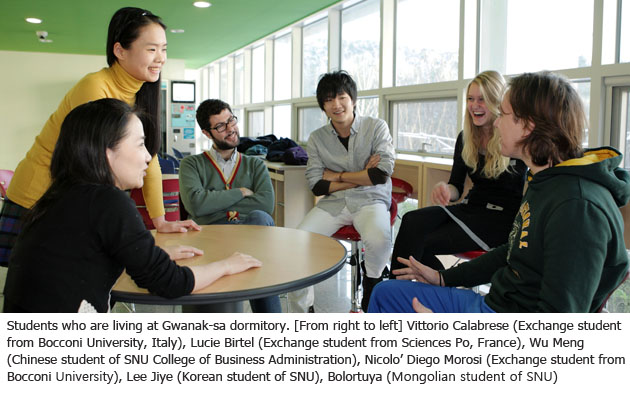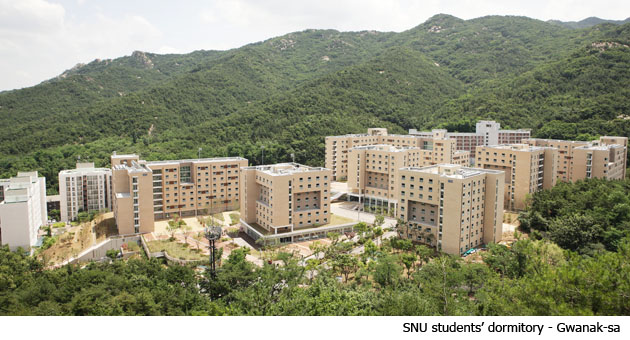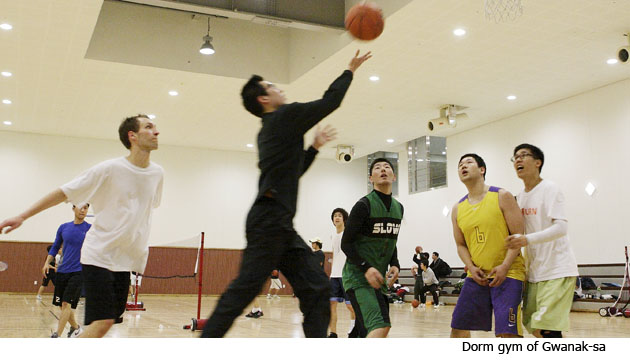
Ninety-Six Percent of Foreign Students Satisfied with the Dormitory
Counting SNU's own students and the exchange students from abroad, there are a total of 1,091 foreign students living in 'Gwanaksa', the SNU dormitory. What is it like to live in this multicultural community that consists of people with more than 50 national backgrounds?
According to a survey conducted by the Gwanaksa administration office last October, the foreign students' satisfaction with dormitory life is very high, with 63% of the 198 foreign students saying that they are"very satisfied with living in the dormitory", and 33% saying that they are"generally satisfied."
Up on being asked whether they like their roommates, 61% said,"I like my roommate very much," reflecting the friendly atmosphere in the dormitory. Rather than allowing residents to choose their own roommates, Gwanaksa administrators pair residents with roommates through a random matching system without regard to age, nationality, and department. Even so, 81% of the foreign residents answered that"I have never had a conflict with my roommate."
What makes SNU dormitory life so satisfactory?
To answer this question, we met five foreign students living in Gwanaksa, and their Korean roommates.
"We make more friends in the dormitory than in the classrooms."

All of the interviewees said that they made more friends in the dormitory than in the classrooms.
"Since the living patterns in the dormitory such as having meals and going to class are similar, it is easy to gain a sense of unity here. It is hard to connect with other students in class because they all go their separate ways after class is over," said Vittorio Calabrese, an exchange student from the University of Bocconi, Milan."The thing about dormitory friends is that, since I run into them everywhere all the time, such as during meals or on my way to do the laundry or at Global House (the dorm pub), it's easier to strike up a conversation with them," said Bolortuya, an SNU student from Mongolia.
Students who told us about their dormitory lives (from the left): Vittorio Calabrese (an exchange student from the University of Bocconi, Italy), Lucie Birtel (exchange student from Sciences Po, France), Wu Meng (Chinese student), Nicolo Diego Morosi (exchange student from Bocconi, Italy), Ji-ye Lee (Korean student), and Bolortuya (Mongolian student).
As if to prove what the interviewees had just said, several students tapped on some of the interviewees' shoulders and said hi as they passed by, even as we talked in the dormitory cafe. Nicolo Morosi, who exchanged nods with most of the students studying in the cafe, told us his own way of making friends.
"It works best at the dormitory convenience store. If you see someone who is having trouble choosing what to eat, recommend something, and then you'll find yourself having a conversation with him/her in no time."
In fact, the 24-hour dormitory convenience store is where foreign students visit most to hang out.
"In France, dinner starts at eight o'clock at the earliest, but here, since school cafeterias open for dinner at five-thirty and close at seven, I always get hungry at night and end up going to the convenience store," said Lucie, as the others agreed with laughter.
In this way, the dormitory convenience store became a special place where one can make friends with foreign students. Before the weather turned cold, every night one could easily hear the chatter and banter of students from all over the world as they hung out around the shabby plastic table in front of the convenience store.
Roommate: A Life Mate

It's great to make new friends this way, but it's an unwritten rule not to invite them over to your room. This is etiquette among roommates. No matter how good the dormitory facilities may be, if you don't get along with your roommate, life can become miserable.
Ji-ye Lee, a Korean student, and Bolortuya, a Mongolian student, are 'roomies' that get along so well that they were nominated as 'exemplary roommates' by the dormitory office.
"Ji-ye takes care of me like a mother. When I'm studying, she hands me snacks that her mother packed for her. Not even my real mother took care of me so well."
It is her second semester in the dorm for Lucie Birtel, an exchange student from the prominent Sciences Po in France. She became roommates with a Korean freshman much younger than her, but she says they"couldn't be more compatible."
"I was very lucky. Even though she's a freshman, she is fluent in English and great to talk to. I like studying in our room, and thankfully, she stays quiet to let me study. I ended up studying more than I had planned to when I came to Seoul."
'Gwanak temple monk' on weekdays, and back to the 'secular world' on weekends--"I hadn't planned on studying this much"
Wu Meng, a Chinese student in the Department of Business Administration, defined daily life in Gwanaksa as"living like a monk on weekdays and like a twenty-something on weekends."
"You know how quiet Gwanaksa is, actually being located on the slope of Gwanak Mountain. It makes you feel like a monk studying here."
When Wu Meng first came to Korea, he refused to live in the dormitory and lived instead in Shinchon (where Yonsei University is located), in envy of his Yonsei University friends living in a more bustling area of the city.
"Then, after I moved into Gwanaksa, I got used to the monastic life and ended up studying a lot. I hadn't planned on studying this hard."
When he gets tired of his 'monastic life', he visits Myungdong or Shinchon, which are more crowded areas of the city."I just walk through the crowd," he says,"breathe the air of the secular world, and then come back."
Foreign students say that Gwanaksa's peacefulness is something one can only experience in Korea."This is probably the only dormitory in the world that can remain so quiet and clean without a curfew or a superintendent," said Bolortuya.
It is a humble wish of these young 'monks' to perhaps have a loud party at this normally quiet dormitory. The headmaster of the dormitory, Professor Sung-hee Kim of the Department of Fine Arts, says she will continue to hold special events for the dormitory residents, such as Foreign Students' Week, which will be held in October.
Translated by KIM Jaeseung, SNU English Editor, brainophone@naver.com ?
Reviewed by Eli Park Sorensen, SNU Professor of Liberal Studies
Proofread by Brett Johnson, SNU English Editor

